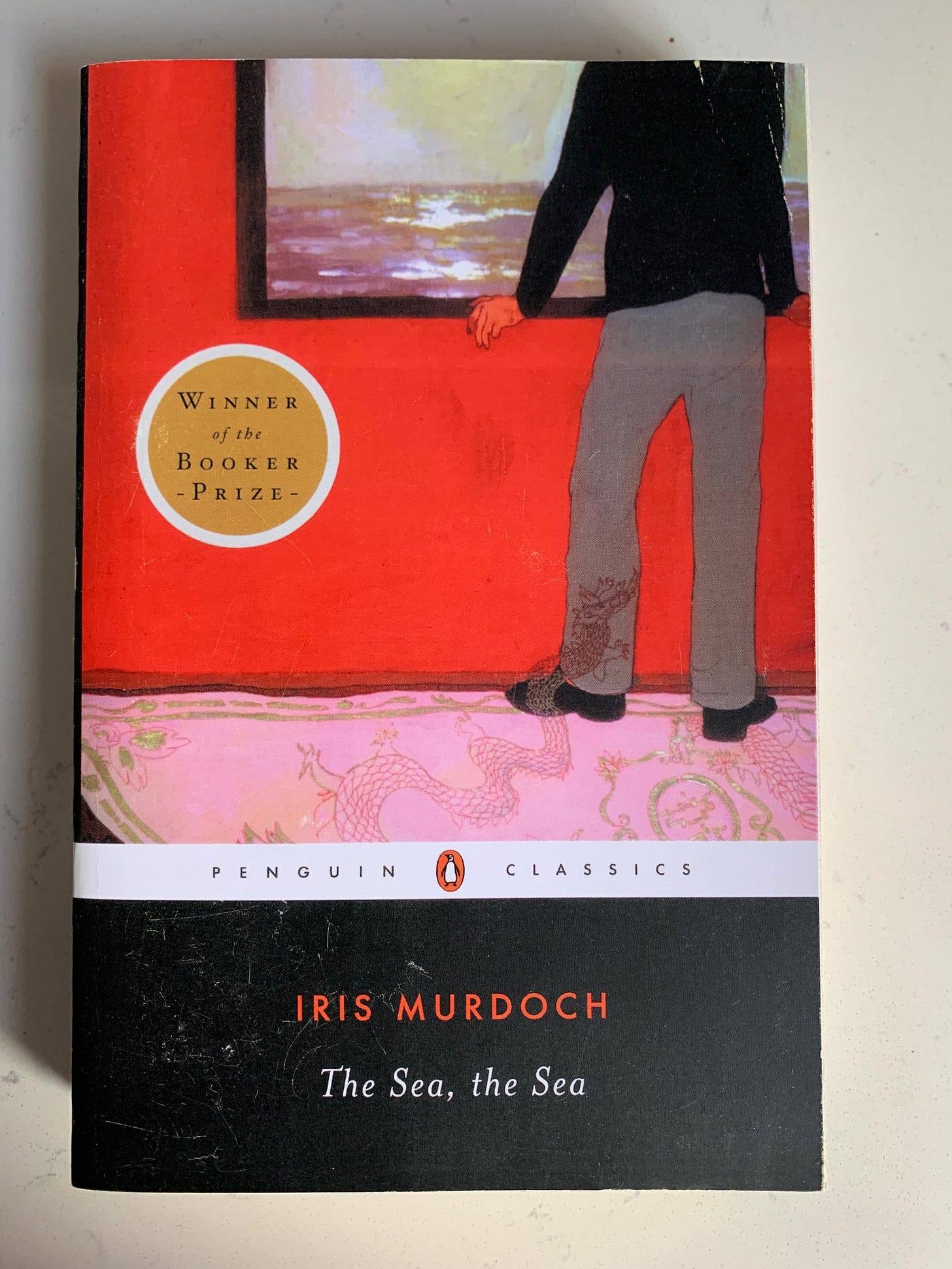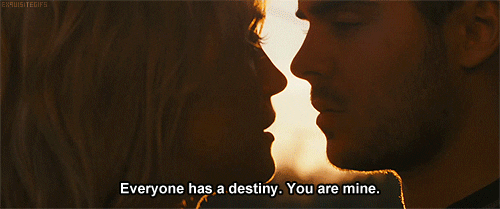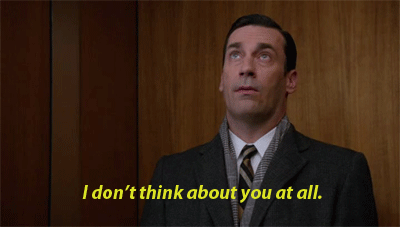'The Sea, the Sea' by Iris Murdoch
'Upon the demon-ridden pilgrimage of human life, what next I wonder?' —Review #173

I came into Iris Murdoch’s Booker Prize-winning novel, ‘The Sea, the Sea,’ completely cold when I started it during a quiet weekend in Montauk. Based solely on the title, it seemed the perfect book to bring on a trip where my goals were to read, relax and listen to the ocean. I don’t remember how the book got on my radar, or where I bought it; somebody must have mentioned it in a tweet or something, and somehow it manifested into my pile. What a book! It surprised me, exasperated me, scared me a bit and, ultimately, enriched me.
Here’s the cover:

Here’s the gist. Charles Arrowby is a famous director who has just retired from London’s theater world and bought a house, called Shruff End, on the coast. It is rundown, has leaks and is possibly haunted. It also has direct access to the sea, where Arrowby takes restorative swims. In addition, it has plenty of space and quiet for him to write his memoirs, which form the content of this novel. Through his entries, which recount events of the past and present, his character takes shape: Arrowby is a vain, arrogant and self-centered man, puffed up by fame and success in the theater and at bedding actresses. He’s broken up marriages, though never himself been married, and strung along stars and ingénues alike. He claims he’s incapable of loving any woman other than his first love, a teenage crush named Hartley, who has been out of his life for decades. In one entry, Arrowby recounts a visit from a former mistress. It’s night time, there’s an argument, and she storms out of Shruff End. Arrowby follows her to her car, and as she drives into the road the headlights shine on someone walking by. It’s her—Hartley, his long-lost love. Later, he sees her again in the nearby town, and they quickly catch up. He talks over her for most of their conversation, but he shuts up long enough to learn that she also is retired and that she and her husband live in the area. Arrowby views their reunion to be the work of fate, like:
But she’s like:
Arrowby is bent on rekindling their relationship, and he can’t understand why Hartley doesn’t leave her husband and come to him. His jealousy increases, morphing into a consuming rage. His behavior becomes increasingly bizarre and irrational, and his plotting, scheming and illogical interpretations of reality make for riveting reading. I was reminded of ‘Rebecca,’ where every page seemed to bring a new twist or shock. I stayed up late because I couldn’t put this book down. I got up early to get more details before starting work. I was like:

‘The Sea, the Sea’ was not only an entertaining exploration of jealousy, vanity and the anxieties of growing old, but it also presents a thought experiment. All of us have a Hartley in our past. The novel asks us what we would do if we encountered that person again. Would we be knocked off-kilter by their sudden presence? Would a friendship be possible? Or would we, too, be consumed by a yearning to resume the past? I was chilled by this last thought; I have no desire to reconnect to, and relive the angst associated with, the Hartleys of my life. Murdoch’s story rightly shows that these encounters are risky, and that it is best to leave our Hartleys in the past like:
Murdoch’s writing, as you can see below, is fluid and evocative. One small technical detail I love: As Arrowby’s story develops, his writing style shifts from a diary to prose. Murdoch nods to this change by having Arrowby say that he’s going to pull a Truman Capote and use fiction-writing techniques to tell his personal story. I appreciated this because it irks me when a first-person character’s narration reads like they, too, are an accomplished writer or a former lit major and not an individual with a voice different from their creator. Murdoch acknowledges and sidesteps the issue with Arrowby’s small aside, and I was like:

‘The Sea, the Sea’ is beautiful and intense. It starts slow, but turns into a psychological buzzsaw once it gets going. It’s one of the best books I’ve read this year, and I highly recommend it.
How it begins:
The sea which lies before me as I write glows rather than sparkles in the bland May sunshine. With the tide turning, it leans quietly against the land, almost unflecked by ripples or by foam. Near to the horizon it is a luxurious purple, spotted with regular lines of emerald green. At the horizon it is indigo. Near to the shore, where my view is framed by rising heaps of humpy yellow rock, there is a band of lighter green, icy and pure, less radiant, opaque however, not transparent. We are in the north, and the bright sunshine cannot penetrate the sea. Where the gentle water taps the rocks there is still a surface skin of colour. The cloudless sky is very pale at the indigo horizon which it lightly pencils in with silver. Its blue gains towards the zenith and vibrates there. But the sky looks cold, even the sun looks cold.
I had written the above, destined to be the opening paragraph of my memoirs, when something happened which was so extraordinary and so horrible that I cannot bring myself to describe it even now after an interval of time and although a possible, though not totally reassuring, explanation has occurred to me. Perhaps I shall feel calmer and more clear-headed after yet another interval.
I spoke of a memoir. Is that what this chronicle will prove to be? Time will show. At this moment, a page old, it feels more like a diary than a memoir. Well, let it be a diary then. How I regret that I did not keep one earlier, what a record that would have been! But now the main events of my life are over and there is to be nothing but ‘recollection in tranquility.’ To repent of a life of egoism? Not exactly, yet something of the sort. Of course I never said this to the ladies and gentlemen of the theatre. They would never have stopped laughing.
My rating:
‘The Sea, the Sea’ by Iris Murdoch was first published in Great Britain by Chatto & Windus in 1978. The Penguin Books edition was published in 2001. 495 pages. $18.40 at Bookshop.org.
Let’s discuss:
Which book has surprised you the most?
What’s next:
Before you go:
ICYMI: Review #172:
Read this: ‘Next of Kin’ by Jo Gatford in SmokeLong Quarterly is a one-sentence work of flash fiction that was retweeted into my timeline recently. It’s beautiful and a marvel of punctuation and sentence construction.
Thanks for the shoutout! Special thanks to Becky, who writes the RA for All blog for librarians, for highlighting Books on GIF in a recent post. She describes BoG as an ‘outside the box’ resource for readers: Exactly what we’re striving to be! To everybody who found BoG through RA for All:
Thanks for reading, and thanks especially to Donna for editing this newsletter!
Until next time,

MPV













I have wondered about this one for years. Maybe I'll finally read it!
This one has been in my to-read pile for literally YEARS, but you just bumped it way up to the top! I had no idea that's what it was about. (I don't really know what I thought it was, but it certainly wasn't that!)